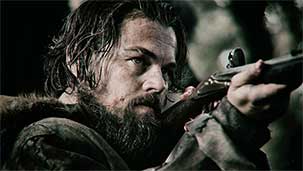You are the yin to Quentin Tarantino’s despicable yang. If you ever met and shook hands I fear that the resulting implosion of egos would envelope the universe. Your film, The Revenant—a period piece set in the American frontier of the early 1800’s—shares enormous similarities, at least in broadly thematic terms, with Tarantino’s The Hateful Eight.
These are visually ambitious, violent, sausage-fests filled with men going about the business of bringing death and destruction to themselves and others in settings that underpin how little our ambitions mean. Each depends upon the harshness of the environment to prop up their central conceits. In the Hateful Eight, it is used to facilitate a kind of locked room mystery that leans suspiciously towards the kind of paranoid tension that infuses John Carpenters The Thing. In The Revenant the wintry frontier is where men find their limits and are tested as moral creatures. It is a crucible that sorts the wheat from the chaff. The relentless, unforgiving weather is also an essential backdrop that parallels the kind of men that it attracts—ruthless, volatile and often fundamentally amoral.
Women are only present as uni-dimensional props. This is more to do with the period and location than anything else but it is not a coincidence that each of you specifically chose these settings. Both films, as well, are similarly possessed of a kind of blunt-edged philosophical bent—that more often than risks being overshadowed by the bombast of elevated performances and stunning visual flourishes.
The difference is that the The Revenant’s philosophical underpinnings, while crude, are fully realized, whereas the best than can be said about The Hateful Eight is that the 70mm print sure looks nice. Still, The Revenant is a flawed film, with a central problem it never manages to solve. Even as you successfully express the films straightforward thesis about the hollowness of our collective ambitions and desires, (especially in an environment that often annihilates us with an indifference that is literally chilling) the narrative never manages to really connect this to characters that feel fully realized. As engaging as they are, their motivations remain opaque and often seem fleeting—more contrivance than real.
With performances that are often memorable and idiosyncratic—Domhnall Gleeson and Tom Hardy are rapidly becoming two of the best English language actors around—there is still something untethered about them. The film never manages to connect all its various moving parts, despite DiCaprio’s strong lead and an interesting cast. Part of this is a problem of tone; too often the film meanders narratively when it should be as lean as its characters. However, that can and is often saved by the incredible sweep of the visuals, and the strength of the various interludes of violence and the incredible kineticism of Emmanuel Lubezki’s camera.
The fundamental difficulty, though, is withyour intent. While it is clear what the film expresses, it is not at all clear as to why that expression is worth the work the audience and the characters have to do. A more significant connection needs to be made between why these truths that bang up against one another—individual ambition and desire versus the disinterest of nature—are worthwhile subjects of yet another film. This is, after all, well trodden ground, with any number of films having explored it to greater or lesser degrees of success: Jeremiah Johnson, Little Big Man, The Last Of The Mohicans all have mined this territory extensively.
Still, just as a filmmaking venture bereft of any particular subtext, this is an incredible piece of work. It is head and shoulders above most films I have seen this year, in purely cinematic terms, and will likely win a lot of praise. It is worth seeing as entertainment, even if it falls short as a fully realized work of art.
Despite being a far better filmmaker, at least in terms of scope and originality and perhaps also artistically, you seem to be held to a different critical standard than Tarantino. Whereas you are derided for arrogance or self-regard and lofty, if simplistic, philosophical ambitions, Tarantino seems to be lauded for an ego than perhaps eclipses yours and a philosophical disposition that can be most charitably described as sophomoric. But that is an argument best had elsewhere.
Sincerely,

Tim







